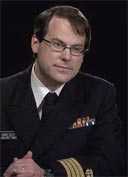Influenza Division’s Dr. Joe Bresee Recognized for 2016 Horne Award
Dr. Joe Bresee, Chief of the Epidemiology and Prevention Branch (EPB) in the Influenza Division, was selected to receive the 2016 Philip R. Horne Award, the highest recognition bestowed by the National Center for Immunization and Respiratory Diseases (NCIRD). This award is given annually to recognize someone whose career demonstrates exceptional ideals, innovation, and commitment to immunization practices. It is presented at the annual National Immunization Conference to an employee who has made significant contributions to advance NCIRD’s mission, served as a role model to others in the field of vaccine-preventable diseases, and accomplished work that has measurable impact at the national or international level.

Dr. Joe Bresee, CDC Influenza Division
Dr. Bresee is a globally recognized expert on immunization and works closely with the World Health Organization, other international partners, and federal and state immunization officials and agencies. He was instrumental in the early development of vaccination programs for rotavirus, leading eventually to the prevention of a significant global burden of diarrheal disease. Among his many contributions in the field of influenza immunization, Dr. Bresee established networks for the first “test-negative design” influenza vaccine effectiveness studies in the United States (U.S. Flu VE Network), now the gold standard, providing annual estimates on the effectiveness of flu vaccines. Data from the network have been used to refine influenza vaccine recommendations to maximize benefit from vaccination. Bresee also oversaw the evolution of current U.S. influenza vaccination recommendations, which now encompass vaccination of all persons 6 months of age and older. He has held senior leadership positions for critical activities for both the 2009 influenza pandemic response and the 2014-2016 Sierra Leone Trial to Introduce a Vaccine Against Ebola (STRIVE).
Dr. Bresee’s passion extends to the global arena. He is particularly passionate about decreasing global disparity in access to influenza vaccines. Recognizing that low influenza vaccination rates result in substantial morbidity and mortality, he conceived an innovative idea: vaccine program development catalyzed by donations through a public-private partnership. Dr. Bresee subsequently developed the Partnership for Influenza Vaccine Initiative, or PIVI. Started in 2007, PIVI works with a wide range of stakeholders to develop sustainable influenza vaccination programs to reduce the burden of influenza globally. PIVI is now coordinated by the Task Force for Global Health, with external partners including the Bill & Melinda Gates Foundation, Seqirus, Hualan, Green Cross, Bollore Logistics, Walgreens, UPS, ASD Healthcare, BD, Unicef, the Pan American Health Organization, and the World Health Organization. The program continues to grow and, as of 2016, has put vaccine into the arms of more than 1.6 million people including more than 130,000 pregnant women.
Dr. Bresee trained at Baylor College of Medicine in Houston, and then completed his Pediatric Residency at Children’s Hospital and Medical Center at the University of Washington in Seattle. He joined CDC in 1993 as an Epidemic Intelligence Service (EIS) officer in the Influenza Branch. From 1995 to 2005, Dr. Bresee served as a staff epidemiologist and medical officer in CDC’s Division of Viral Diseases, specializing in viral gastrointestinal infections and respiratory infections. In 2005, he became Epidemiology Team Lead in the Influenza Division where he has led EPB since that time. Dr. Bresee also is a captain in the U.S. Public Health Service.
The Horne Award is named for Philip R. Horne, who worked with CDC’s National Immunization Program for about 30 years, serving as its associate director for program and management. He communicated closely with staffers in both the House of Representatives and the Senate to provide programmatic information about disease incidence, the cost of vaccines, and personnel needed to conduct successful immunization programs at federal, state, and local levels. His office developed cost benefits analysis of immunization and the relationship between disease incidence and federal budget support. Since Horne’s retirement in 1995, the Philip R. Horne Award has been presented annually to a person deemed most responsible for successful immunization efforts – including programmatic, educational, laboratory, and other activities.
- Page last reviewed: November 3, 2016
- Page last updated: November 3, 2016
- Content source:


 ShareCompartir
ShareCompartir